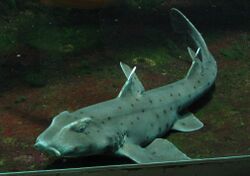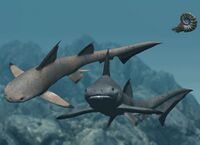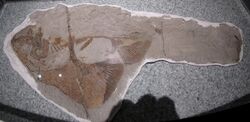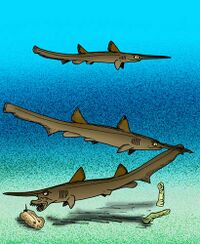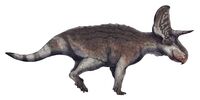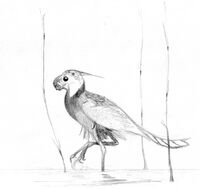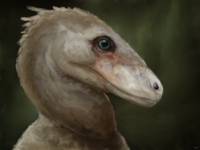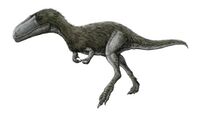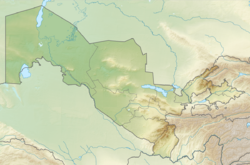The Bissekty Formation (sometimes referred to as Bissekt) is a geologic formation and Lagerstätte which crops out in the Kyzyl Kum desert of Uzbekistan, and dates to the Late Cretaceous Period. Laid down in the mid to late Turonian, it is dated to about 92 to 90 Ma (million years ago).[1]
Description
The lithology of the sediment largely consists of cross bedded sandstones with interbeds of massive sandstone, well cemented intraformational conglomerate, siltstones and mudstones. Most of the fossils are found as clasts within the conglomerates.[2]
Fossil content
The Bissekty Formation is characterised by a mix of marine, brackish, freshwater, and terrestrial animal fossils. This stands in contrast the strictly marine fossils found in the underlying Dzheirantui Formation, and indicates that the Bissekty was formed during the regression of a saltwater sea. The coastline expanded inland again in the upper portion of the Bissekty, represented by a proportional increase of fully aquatic species, which were almost completely absent from the middle period of the formation. Semi-aquatic species remained abundant during this middle period, and the geology of the formations indicates that a braided river system took the place of the coastline. Eventually the area was again completely underwater, during the time period represented by the later Aitym Formation, which preserves coastal marine sediments.[2]
Vertebrates
The Bissekty Formation is notable for preserving the most abundant Turonian land animal fossils in Eurasia, and the most diverse fauna of Late Cretaceous eutherians (placental mammals and relatives) in the world.[2]
Listings and accompanying information are based on a survey of the Bissekty Formation published by Cory Redman and Lindsey Leighton in 2009 unless otherwise noted.[2] Aquatic and semi-aquatic species are restricted to freshwater unless otherwise noted.
Amphibians
An indeterminate species of salamander-like albanerpetontid amphibian. An indeterminate gobiatid species.
Cartilaginous fish
Crocodylomorphs
Lizards
An indeterminate gekkonid. An indeterminate priscagamid. An indeterminate scincid.
| Lizards of the Bissekty Formation
|
| Genus |
Species |
Location |
Stratigraphic position |
Abundance |
Notes
|
| Buckantaus
|
B. crassidens
|
|
|
|
A macrocephalosaurid
|
| Ekshmer
|
E. bissektensis
|
|
|
|
A priscagamid
|
Mammals and other therapsids
| Mammaliaformes of the Bissekty Formation
|
| Genus |
Species |
Location |
Stratigraphic position |
Abundance |
Notes
|
| Aspanlestes
|
A. aptap
|
|
|
|
A zhelestid
|
| Bulaklestes
|
B. kezbe
|
|
|
|
An asioryctitherian
|
| Daulestes
|
D. inobservabilis
|
|
|
|
An asioryctitherian
|
| D. kulbeckensis
|
|
|
|
An asioryctitherian
|
| Eoungulatum
|
E. kudukensis
|
|
|
|
A zhelestid
|
| Kulbeckia
|
K. kulbecke
|
|
|
|
A zalambdalestid
|
| Paranyctoides
|
P. quadrans
|
|
|
|
An eutherian
|
| Parazhelestes
|
P. mynbulakensis
|
|
|
|
A zhelestid
|
| P. robustus
|
|
|
|
A zhelestid
|
| Shalbaatar
|
S. bakht
|
|
|
|
A symmetrodont
|
| Sulestes
|
S. karakshi
|
|
|
|
A deltatheroid
|
| Uchkudukodon
|
U. nessovi
|
|
|
|
An asioryctitherian
|
| Uzbekbaatar
|
U. kizylkumensis
|
|
|
|
A cimolodont
|
| Zhelestes
|
Z. temirkazyk
|
|
|
|
A zhelestid
|
Plesiosaurs
| Plesiosaurs of the Bissekty Formation
|
| Genus |
Species |
Location |
Stratigraphic position |
Abundance |
Notes |
Images
|
| Plesiosauria
|
Indeterminate
|
|
|
|
Marine, possibly tolerant of brackish water
|
|
Pterosaurs
Ray-finned fish
Based on Brinkman et al (2025):[3]
Dinosaurs
Sauropods
Ornithischians
Template:Paleobiota-key-compact
Theropods
An indeterminate tyrannosauroid species, known from isolated teeth.[12]
Carcharodontosauridae
| Carcharodontosaurs of the Bissekty Formation
|
| Genus |
Species |
Location |
Stratigraphic position |
Material |
Description |
Images
|
| Carcharodontosauridae
|
Indeterminate
|
|
|
A partial posterior dorsal vertebra[13]
|
|
|
| Ulughbegsaurus
|
U. uzbekistanensis
|
|
|
A left maxilla, the ramus end of a left maxilla, and the posterior end of a right maxilla.
|
A probable carcharodontosaurid theropod
|
|
Enantiornithines
| Enantiornithines of the Bissekty Formation
|
| Genus |
Species |
Location |
Stratigraphic position |
Material |
Description |
Images
|
| Abavornis
|
A. bonaparti
|
|
|
Known from a partial coracoid[14]
|
A possible enantiornithine.[14] A possible second species of Abavornis in the Bissekty Formation is known from a partial coracoid.[14]
|
|
| Catenoleimus
|
C. anachoretus
|
|
|
|
A possible enantiornithine
|
|
| Explorornis
|
E. nessovi
|
|
|
|
An enantiornithine. Possible third and fourth species of Explorornis in the Bissekty Formation are known from partial coracoids.[14]
|
|
| E. walkeri
|
|
|
"Coracoid"[15]
|
|
| Ichthyornis
|
I. minusculus
|
|
|
"Dorsal vertebra"[16]
|
An enantiornithine originally but incorrectly identified as a species of Ichthyornis.[17]
|
|
| Incolornis
|
I. martini
|
|
|
Known from a partial coracoid[14]
|
A possible enantiornithine[14]
|
|
| I. silvae
|
|
|
Known from a partial coracoid[14]
|
A possible enantiornithine[14]
|
|
| Kizylkumavis[7]
|
K. cretacea[7]
|
|
|
"Distal humerus"[15]
|
An enantiornithine
|
|
| Kuszholia
|
K. mengi
|
|
|
"[Two] synsacra"[18]
|
An enantiornithine
|
|
| Lenesornis[7]
|
L. maltshevskyi[7]
|
|
|
"Synsacrum"[15]
|
A possible enantiornithine
|
|
| cf. Nanantius
|
|
|
|
|
An enantiornithine, similar to Nanantius eos
|
|
| Sazavis[7]
|
S. prisca[7]
|
|
|
"Distal tibiotarsus"[19]
|
An enantiornithine
|
| Zhyraornis[7]
|
Z. kashkarovi[7]
|
|
|
"Synsacrum"[19]
|
|
|
| Z. logunovi[7]
|
|
|
"Synsacrum"[19]
|
|
|
Other theropods
Turtles
An indeterminate trionychid (soft-shell) turtle species that was tolerant of brackish water.
Invertebrates
An indeterminate species of marine coral.
Arthropods
| Arthropods of the Bissekty Formation
|
| Genus |
Species |
Location |
Stratigraphic position |
Abundance |
Notes
|
| Linuparus
|
L. dzheirantuiensis
|
|
|
Marine
|
A spiny lobster
|
Molluscs
An indeterminate species of marine placenticeratid ammonite. An indeterminate species of marine teredinid shipworm. An indeterminate marine trigoniid bivalve. An indeterminate marine veneroid bivalve.
| Molluscs of the Bissekty Formation
|
| Genus |
Species |
Location |
Stratigraphic position |
Abundance |
Notes
|
| Crassatelites
|
Indeterminate
|
|
|
|
A marine crassatellid bivalve
|
| Mytiloides
|
M. labiatus
|
|
|
|
A marine inoceramid bivalve
|
| Plagiostoma
|
Indeterminate
|
|
|
|
A marine limoid bivalve
|
| Quadratotrigonia
|
Indeterminate
|
|
|
|
A marine trigoniid bivalve
|
| Xylophaga
|
Indeterminate
|
|
|
|
An indeterminate species of marine shipworm
|
References
- ↑ Averianov, Alexander; Sues, Hans-Dieter (April 2012). "Skeletal remains of Tyrannosauroidea (Dinosauria: Theropoda) from the Bissekty Formation (Upper Cretaceous: Turonian) of Uzbekistan". Cretaceous Research 34: 284–297. doi:10.1016/j.cretres.2011.11.009. ISSN 0195-6671. Bibcode: 2012CrRes..34..284A.
- ↑ 2.0 2.1 2.2 2.3 Redman & Leighton, 2009
- ↑ 3.0 3.1 Brinkman, Donald B.; Kundrát, Martin; Ward, David J.; Murray, Alison M.; Aimbetov, Izzet K.; Van Loon, Lisa L.; Banerjee, Neil R. (2026-02-01). "Fish Faunas from the Bissekty Formation (Turonian), Uzbekistan: Insights into biogeographic connectivity and climate-driven Faunal Turnover". Cretaceous Research 179: 106252. doi:10.1016/j.cretres.2025.106252. ISSN 0195-6671. https://www.sciencedirect.com/science/article/pii/S0195667125001752.
- ↑ Grande, G; Bemis, E (2014). A comprehensive phylogenetic study of amiid fishes (Amiidae) based on comparative skeletal anatomy. An empirical search for interconnected patterns of natural history. (project). doi:10.7934/p482.
- ↑ Gardner, James D.; Brinkman, Donald B.; Murray, Alison M. (2025-06-01). "Reidentification of the holotype of ‘Ceratodus’ hieroglyphus Cope from the Upper Cretaceous (Campanian) of Montana, USA, as the scale of a holostean fish" (in en). Palaeobiodiversity and Palaeoenvironments 105 (2): 545–572. doi:10.1007/s12549-025-00663-4. ISSN 1867-1608. https://doi.org/10.1007/s12549-025-00663-4.
- ↑ Lerzo, Lucas Nicolás; Carballido, José Luis; Gallina, Pablo Ariel (30 April 2021). "¿Saurópodos Rebbaquisáuridos en Asia? Una Re-Evaluación de la Posición Filogenética de Dharatitanis Kingi del Cretácico Tardío de Uzbekistán" (in en). Publicación Electrónica de la Asociación Paleontológica Argentina 21 (1): 18–27. doi:10.5710/PEAPA.24.03.2021.389. ISSN 2469-0228. https://www.peapaleontologica.org.ar/index.php/peapa/article/view/Pdf.
- ↑ 7.00 7.01 7.02 7.03 7.04 7.05 7.06 7.07 7.08 7.09 7.10 7.11 7.12 7.13 7.14 "Dinosaur distribution (Bissekty Formation)." Weishampel, et al. (2004). Pg. 594.
- ↑ 8.0 8.1 8.2 Averianov, 2002
- ↑ "Table 20.1," in Weishampel, et al. (2004). Page 442.
- ↑ "Table 17.1," in Weishampel, et al. (2004). Page 367.
- ↑ Sues & Averianov, 2009
- ↑ Archibald, James David; Sues, Hans-Dieter; Averianov, Alexander; King, Chris; Ward, David John; Tsaruk, Oleg; Danilov, Igor; Rezvyi, Anton et al. (1998). "Precis of the Cretaceous paleontology, biostratigtaphy and sedimentology at Dzharakuduk (Turonian?-Santonian), Kyzylkum Desert, Uzbekistan". Bulletin of the New Mexico Museum of Natural History and Science 14: 21–27.
- ↑ Averianov, Alexander O.; Sues, Hans-Dieter (2024-11-06). "New evidence for the presence of carcharodontosaurid theropod dinosaurs in the Late Cretaceous of Uzbekistan" (in en). Historical Biology: 1–7. doi:10.1080/08912963.2024.2423675. ISSN 0891-2963. https://www.tandfonline.com/doi/full/10.1080/08912963.2024.2423675.
- ↑ 14.0 14.1 14.2 14.3 14.4 14.5 14.6 14.7 Panteleev (1998). ""New species of enantiornithines (Aves: Enantiornithes) from the Upper Cretaceous of Central Kyzylkum." Russkii Ornitologicheskii Zhurnal". Ekspress-vy.PVSK 35: 3–15.
- ↑ 15.0 15.1 15.2 "Table 11.1," in Weishampel, et al. (2004). Page 213.
- ↑ 16.0 16.1 "Table 11.1," in Weishampel, et al. (2004). Page 216.
- ↑ Kurochkin. (1996). "A new Enantiornithid of the Mongolian Late Cretaceous, and a general appraisal of the Infraclass Enantiornithes (Aves)." Russian Academy of Sciences, special issue: 50pp.
- ↑ "Table 11.1," in Weishampel, et al. (2004). Page 212.
- ↑ 19.0 19.1 19.2 "Table 11.1," in Weishampel, et al. (2004). Page 214.
- ↑ "Table 8.1," in Weishampel, et al. (2004). Page 166.
- ↑ Averianov, A. O.; Sues, H.-D. (2025). "A new ornithomimid theropod from the Upper Cretaceous Bissekty Formation of Uzbekistan". Journal of Vertebrate Paleontology: e2433759. doi:10.1080/02724634.2024.2433759.
- ↑ "Table 10.1," in Weishampel, et al. (2004). Page 199.
- ↑ "Table 9.1," in Weishampel, et al. (2004). Page 185.
- ↑ Nesov, A. (1995). "Dinosaurs of Northern Eurasia: new data about assemblages, ecology and paleobiogeography." Scientific Research Institute of the Earth's Crust. St. Petersburg State University, St. Petersburg, Russia: 156 pp. + 14 pl. [in Russian with short English, German, and French abstracts].
- ↑ Sues, H.-D.; Averianov, A. (2016). "Therizinosauroidea (Dinosauria: Theropoda) from the Upper Cretaceous of Uzbekistan". Cretaceous Research 59: 155–178. doi:10.1016/j.cretres.2015.11.003. Bibcode: 2016CrRes..59..155S.
- ↑ Stephen L. Brusatte; Alexander Averianov; Hans-Dieter Sues; Amy Muir; Ian B. Butler (2016). "New tyrannosaur from the mid-Cretaceous of Uzbekistan clarifies evolution of giant body sizes and advanced senses in tyrant dinosaurs". Proceedings of the National Academy of Sciences of the United States of America 113 (13): 3447–3452. doi:10.1073/pnas.1600140113. PMID 26976562. Bibcode: 2016PNAS..113.3447B.
- ↑ Averianov, A.O.; Sues, H.-D. (2007). "A new troodontid (Dinosauria: Theropoda) from the Cenomanian of Uzbekistan, with a review of troodontid records from the territories of the former Soviet Union". Journal of Vertebrate Paleontology 27 (1): 87–98. doi:10.1671/0272-4634(2007)27[87:ANTDTF2.0.CO;2].
Bibliography
- Averianov, A.O (2002), "An ankylosaurid (Ornithischia: Ankylosauria) braincase from the Upper Cretaceous Bissekty Formation of Uzbekistan", Bulletin de l'Institut Royal des Sciences Naturelles de Belgique, Sciences de la Terre 72: 97–110, http://biblio.naturalsciences.be/rbins-publications/bulletin-of-the-royal-belgian-institute-of-natural-sciences-earth-sciences/72-2002/irscnb_p4087_01ec04x_72-bulletin-7.pdf, retrieved 2019-03-22
- Redman, C.M.; Leighton, L.R. (2009), "Multivariate faunal analysis of the Turonian Bissekty Formation: Variation in the degree of marine influence in temporally and spatially averaged fossil assemblages", PALAIOS 24 (1): 18–26, doi:10.2110/palo.2007.p07-072r, Bibcode: 2009Palai..24...18R, https://www.researchgate.net/publication/237640161, retrieved 2019-03-22
- Sues, H-D.; Averianov, A. (2016), "Ornithomimidae (Dinosauria: Theropoda) from the Bissekty Formation (Upper Cretaceous: Turonian) of Uzbekistan", Cretaceous Research 57: 90–110, doi:10.1016/j.cretres.2015.07.012, Bibcode: 2016CrRes..57...90S, https://www.researchgate.net/publication/282926613, retrieved 2019-03-22
- Sues, H.-D.; Averianov, A. (2009), "Turanoceratops tardabilis—the first ceratopsid dinosaur from Asia", Naturwissenschaften 96 (5): 645–652, doi:10.1007/s00114-009-0518-9, PMID 19277598, Bibcode: 2009NW.....96..645S, https://www.researchgate.net/publication/24192700, retrieved 2019-03-22
- Weishampel, David B.; Dodson, Peter; Osmólska, Halszka (2004), The Dinosauria, 2nd edition, Berkeley: University of California Press, pp. 1–880, ISBN 0-520-24209-2, https://books.google.com/books?id=vtZFDb_iw40C, retrieved 2019-02-21
Further reading
- Averianov, A.O.; Archibald, J.D.; Ekdale, E.G. (2010), "New material of the Late Cretaceous deltatheroidan mammal Sulestes from Uzbekistan and phylogenetic reassessment of the metatherian-eutherian dichotomy", Journal of Systematic Palaeontology 8 (3): 301–330, doi:10.1080/14772011003603499, Bibcode: 2010JSPal...8..301A, https://www.researchgate.net/publication/233140545, retrieved 2019-03-22
- Averianov, A.O (2007), "New records of azhdarchids (Pterosauria, Azhdarchidae) from the Late Cretaceous of Russia, Kazakhstan, and Central Asia", Paleontological Journal 41 (2): 189–197, doi:10.1134/S0031030107020098, Bibcode: 2007PalJ...41..189A, https://www.researchgate.net/publication/225131202, retrieved 2019-03-22
- Feldmann, R.M.; Schweitzer, C.E.; Redman, C.M.; Morris, N.J.; Ward, D.J. (2007), "New Late Cretaceous lobsters from the Kyzylkum Desert of Uzbekistan", Journal of Paleontology 81 (4): 701–713, doi:10.1666/pleo0022-3360(2007)081[0701:NLCLFT2.0.CO;2], https://www.researchgate.net/publication/250070943, retrieved 2019-03-22
- Storrs, G.W.; Efimov, M.B. (2000), Mesozoic crocodyliforms of north-central Eurasia, In M. J. Benton, M. A. Shishkin, D. M. Unwin, E. N. Kurochkin (eds.), The Age of Dinosaurs in Russia and Mongolia, pp. 402–419, https://www.researchgate.net/publication/259842662, retrieved 2019-03-22
- Sues, H.-D.; Averianov, A. (2014), "Dromaeosauridae (Dinosauria: Theropoda) from the Bissekty Formation (Upper Cretaceous: Turonian) of Uzbekistan and the phylogenetic position of Itemirus medullaris Kurzanov, 1976", Cretaceous Research 51: 225–240, doi:10.1016/j.cretres.2014.06.007, Bibcode: 2014CrRes..51..225S, https://www.researchgate.net/publication/263891965, retrieved 2019-03-22
- Zelenkov, N. V.; Averianov, A. O. (2011), "Synsacrum of a primitive bird from the Upper Cretaceous of Uzbekistan", Paleontological Journal 45 (3): 314–319, doi:10.1134/S0031030111030166, Bibcode: 2011PalJ...45..314Z
 | Original source: https://en.wikipedia.org/wiki/Bissekty Formation. Read more |

